
The United Kingdom, Australia, Portugal and Canada have formally recognized Palestinian statehood, joining about 150 countries, ahead of the United Nations General Assembly this week, as France and five other states are also expected to formally recognize a Palestinian state on Monday. “This is an opportunity to renew our political solidarity,” says Jeremy Corbyn, member of the British Parliament and former leader of the U.K. Labour Party. “It also actually further isolates the United States in global opinion, because the United States is the only real big country that still supports Israel.” Corbyn joins us from a Palestinian flag-raising event in London.
Transcript
AMY GOODMAN: This is Democracy Now!, democracynow.org. I’m Amy Goodman.
In a historic move, Britain, Canada, Australia and Portugal have formally declared their recognition of a Palestinian state Sunday ahead of the United Nations General Assembly here in New York. This is British Prime Minister Keir Starmer and Australia’s Prime Minister Anthony Albanese, beginning with Starmer.
PRIME MINISTER KEIR STARMER: I state clearly, as prime minister of this great country, that the United Kingdom formally recognizes the state of Palestine.
PRIME MINISTER ANTHONY ALBANESE: Effective today, Sunday, the 21st of September, 2025, the Commonwealth of Australia recognizes the state of Palestine.
AMY GOODMAN: France and at least five other countries are expected to also recognize Palestine starting today, joining more than 140 countries who now recognize a Palestinian state. Husam Zomlot, the Palestinian ambassador to the United Kingdom, spoke on Sunday.
HUSAM ZOMLOT: We realize that the recognition itself will not stop the wheels of colonization and theft of land and oppression of our people. But the question is never “Why should the U.K. and the rest of the world recognize the state of Palestine?” The question is why the U.K. has not recognized the state of Palestine until now. And the answer is where we are today. Because of the lack of this recognition, because of the lack of this foundational step, things have been left to fester all the way to genocide being committed in full view of the world.
AMY GOODMAN: Several members of the Israeli government responded to the developments by calling for Israel to annex the occupied West Bank.
For more, we’re joined by three guests. We begin with Jeremy Corbyn, member of the British Parliament, served as Labour Party leader from 2015 to 2020, recently hosted a Gaza tribunal that accuses the U.K. of complicity in Gaza genocide.
Welcome back to Democracy Now! It’s great to have you with us. Thank you for joining us from London. Jeremy Corbyn, can you start off by responding to this historic recognition, and what more you would like to see?
JEREMY CORBYN: I’ve just come from an event held outside the Palestine Mission in London, which we now must refer to as the Palestine Embassy, and I’m delighted to be able to do that. And, unfortunately, I wasn’t able to get back to my office; I’m doing this in a park, hence all the noise in the background.
Yes, it is a huge step forward that Britain, after years and years of campaigning and pressure, has finally recognized Palestine and joined the 140 other nations that have done so. But — and this is a huge “but” — what are we recognizing? A people under occupation, a genocide is happening in real time in Gaza, and in the case of Britain, a country that maintains strong economic ties to Israel, continues security cooperation, supplying parts for F-35 jets and allowing RAF airbases to be used by Israeli planes, as well as RAF planes. But what it does do is gives us the chance and the opportunity in Britain to put renewed demands and political pressure on the British government to end all the arms supplies and impose real economic sanctions against Israel.
And in response to this, we’re now organizing the biggest-ever demonstration in support of Palestine on October the 11th in London, because people are just so angry, unbelievably angry, when they see the images of children being starved to death, doctors crying because they cannot perform operations properly because they’ve got no antiseptic, aesthetic, equipment or anything else. And our Gaza tribunal, which the Peace and Justice Project held for two days 10 days ago, was devastating in the evidence that we collected of the legal action and of the way in which the Israeli bombing of Gaza is actually planned all around building of the riviera, which Trump has been dreaming about.
And so, this is an opportunity to renew our political solidarity. It also actually further isolates the United States in global opinion, because the United States is the only real big country that still supports Israel. And so, I think the pressure must be on. And my sympathies and solidarity to all the Palestinian campaigners all across the U.S.A. You can do it, and we are with you, and we’ll support you in any way we can to help force the administration change its policy.
AMY GOODMAN: Jeremy Corbyn, the U.K. is recognizing a Palestinian state based on the 1967 borders, which includes the occupied West Bank and the Gaza Strip. How does this recognition impact the legal standing of Israeli settlements in the West Bank?
JEREMY CORBYN: It damages the pretense that the settlements in the West Bank have some kind of legal status in Israeli law. These settlements are actually a form of occupation. They are part of the Greater Israel plan. What they are is a sort of advanced guard for the complete occupation of the entire West Bank. And so they’ve obviously got to stop and got to go.
And I think it makes their position in international law less and less tenable, because Israel will claim it’s the occupying power, but the occupying power is bound by the Geneva Convention, the Fourth Geneva Convention, on what they can and cannot do, and Israel is doing everything it cannot do in law. And so, international law has been found against Israel on many, many occasions, but unless the rest of the world does something about it, like making sure aid gets in, like making sure the flotilla gets there, like making sure the arms no longer flow, then international law will be brought increasingly into disrepute as a result of this.














Media Options